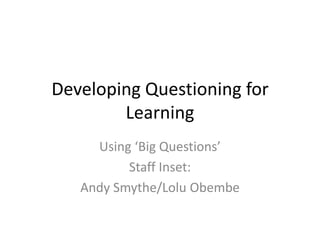
Developing Questioning for Learning
- 1. Developing Questioning for Learning Using ‘Big Questions’ Staff Inset: Andy Smythe/Lolu Obembe
- 2. In the process of planning this inset what were the founding principles? Practical Constructing Thinking Skills Investigating how light intensity varies Choose a starter that can’t be solved with distance? immediately. Create cognitive conflict! But start with concrete preparation …….. Key Skill: Then offer alternatives …. The two graphs… link to maths. Provide more Inverse Proportionality concrete background. Then construct the meaning of the idea Inverse Square Law (how is this different through collaborative work. ‘Social from just an inverse relationship?) construction’ and ‘trial and error experimentation’. Then derive the relationship from the evidence and revisit the abstract problems. Resolve the conflict! Throughout encourage metacognition and reflection.
- 3. In the process of planning this inset what were the founding principles? Practical Constructing the thinking skills Investigating Polarisation and the Building an initial foundation for learning. relationship between two consecutive Concrete preparation….. polarisers. What background science will the students need to get started? Key Skills What do they already know (sunglasses!)? How can I make this concept visual? Building an abstract model, and an explanation of how ‘something works’. How can I help them construct a model through concrete experience? Relating a trend in the data to a possible ‘mathematical fit’. What extra information will the students need to spot the mathematical derivation? (This is probably beyond the realms of their usual learning – do they need prompts?)
- 4. Metacognition Reflecting on Thinking • At first I thought that ……….. • Then I realised that ………. • I had a problem with ………. • It got better when ………… • If I did this in a group again I would ……..